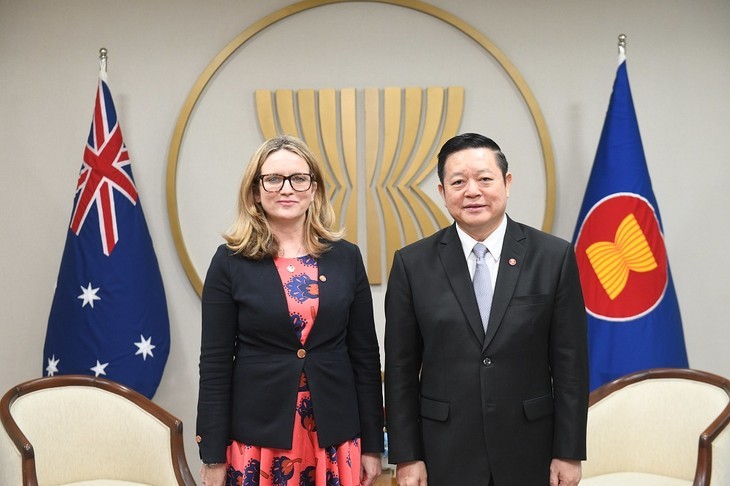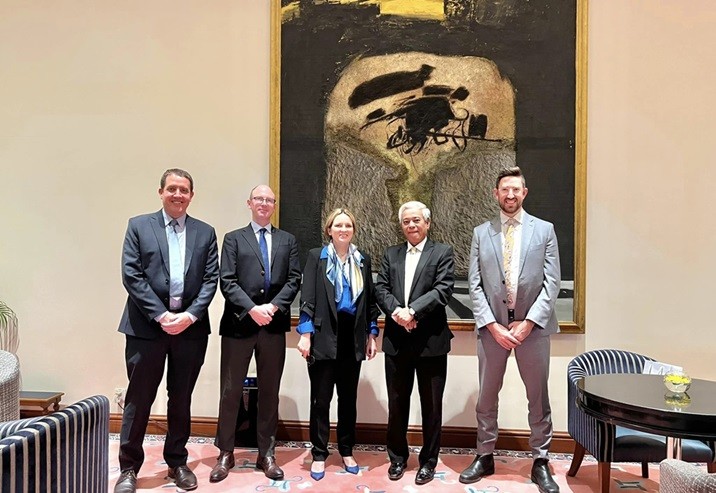
ASEAN and its regional architecture are indispensable for shaping rules and norms: Australian Ambassador to ASEAN
Latest
 |
| Australian Ambassador to ASEAN Tiffany Mc Donald (left) and ASEAN General Secretary Kao Kim Hourn. (Photo: QT) |
Supporting ASEAN’s leadership
ASEAN has performed a vital role in shaping our region over the past six decades and now faces increasingly complex strategic environment. It is timely to review and discuss how ASEAN, including through ASEAN-led architecture such as the East Asia Summit, ASEAN Regional Forum and ASEAN Defence Ministers’ Meeting Plus can address regional and global challenges and support sustainable development for the people of the region.
The ASEAN Charter and the Treaty of Amity of Cooperation in Southeast Asia both set norms for the region and for our approach to preventative diplomacy and conflict prevention. Australia recognises that ASEAN centrality is the key to the region’s stability and security, and we are committed to supporting ASEAN’s leadership.
As ASEAN’s first Dialogue Partner, agreed in 1974, Australia has been a steadfast supporter of ASEAN’s efforts. The ASEAN-Australia Special Summit in Melbourne last month celebrated 50 years of this partnership, also discussed our partnership for the future. In this context, Australia is a strong supporter of ASEAN’s work on its post-2025 agenda, delivering in partnership activities such as a Track 1.5 Forum on the ASEAN Outlook on the Indo-Pacific, and a Track 2 Workshop on the ASEAN-led Regional Architecture and Conflict Prevention. These workshops have been useful to generate discussion within ASEAN and with its Dialogue Partners on ASEAN’s important work for the decades ahead.
I congratulate Vietnam on securing such a strong set of senior presenters and participants for the ASEAN Future Forum. I expect the ASEAN Future Forum will serve as an excellent platform for high-level discussion among leaders, policy makers, academics and youth, on ASEAN’s leading role in navigating the strategic and economic complexities and - importantly the opportunities - in the region we share.
Respecting ASEAN’s collective voice
Australia and ASEAN share a region, and we share a future. We recognise and respect the strength of ASEAN’s collective voice, which carries weight throughout the region when it speaks on the importance of rules and sovereignty.
In addition to being ASEAN’s first Dialogue Partner, I was pleased when Australia became one of ASEAN’s first Comprehensive Strategic Partners. This accomplishment was achieved during Brunei’s ASEAN Chair year in 2021, when I was Australia’s High Commissioner to Brunei. Last month, we were honoured to host ASEAN Leaders, the Prime Minister of Timor-Leste and the Secretary-General of ASEAN in Melbourne for the ASEAN-Australia Special Summit. The Summit’s theme - ‘A Partnership for the Future’ - demonstrated our commitment to close cooperation and working together to address shared priorities into the future. The ASEAN-Australia Leaders agreed a Vision Statement and the Melbourne Declaration, which reaffirmed ASEAN’s centrality in fostering peace and enhancing mutual trust among countries in the Indo-Pacific region.
Our region comprises different political systems, but we share a common interest in maintaining open and transparent communication and norms of cooperation that underpin the character of our region. ASEAN plays a vital role in enabling these norms and Australia is committed to working with ASEAN to pursue a region where differences and disputes are settled in accordance with agreed rules and norms. We want each country – large or small – to operate by the same rules. Rules that we have all had a say in shaping.
ASEAN has such a central leadership role to play in shaping a peaceful, stable and prosperous region. ASEAN remains the primary norm-setting body in our region. It also has unmatched convening power, continuing to bring together all the key players in the Indo-Pacific through its architecture, including the East Asia Summit, ASEAN Regional Forum and ASEAN Defence Ministers’ Meeting Plus.
In terms of potential for cooperation, we are working together under the Comprehensive Strategic Partnership to deliver on ASEAN’s priorities, including under the AUD204 million Aus4ASEAN Futures Initiative. At the ASEAN-Australia Special Summit in Melbourne, the Australian Government announced over AUD500 million in funding for new and expanded initiatives. These initiatives support our shared priorities with ASEAN and include establishing a dedicated ASEAN-Australia Centre to strengthen business, education, cultural and community connections, and new Aus4ASEAN Scholarships and Fellowships for emerging leaders from ASEAN to study in Australia in areas that reinforce the ASEAN Outlook on the Indo-Pacific and build lasting ASEAN-Australia connections.
We are building shared prosperity with ASEAN countries, including through Invested: Australia’s Southeast Asia Economic Strategy to 2040 which is focused on building two-way trade and investment. This includes the Southeast Asia Investment Financing Facility which provides for up to AUD2 billion in loans, guarantees, equity and insurance for projects to boost Australian trade and investment in Southeast Asia.
Other areas for future cooperation were reflected in the Special Summit’s Thematic Tracks, which focused on climate change and the clean energy transition, boosting business engagement, maritime cooperation and engaging the next generation of ASEAN-Australia leaders. This year, Australia and ASEAN will also develop a new ‘Plan of Action’ for our Comprehensive Strategic Partnership, which will set out our cooperation for the five years ahead. So you can see that there is a great deal of cooperation taking place between ASEAN and Australia.
 |
| Australian Ambassador to ASEAN Tiffany Mc Donald and former Deputy Foreign Minister Pham Quang Vinh discussed on the sidelines of the ASEAN Future Forum. (Photo: FB) |
Australia and ASEAN’s shared interests
ASEAN has a central role in promoting peace and stability in the region. What happens in the Indo-Pacific is connected to issues further afield, and vice versa. The Melbourne Declaration, agreed by ASEAN and Australia’s Leaders, is a clear illustration of the broad range of regional and global issues that affect Australia and ASEAN’s shared interests.
We recognise that ASEAN and its regional architecture are indispensable for shaping rules and norms, through ASEAN-led architecture and dialogue. Australia is always working for peace and a firm priority for us is upholding and strengthening the rules that work to prevent conflict. Australia will continue to support ASEAN’s leadership in developing and maintaining the rules and norms that shape the region’s stability and resilience.
One significant development was the release of the 2019 ASEAN Outlook on the Indo-Pacific (AOIP), which outlined ASEAN’s vision for our region. In 2022, Australia and ASEAN released a joint Leaders’ Statement on the AOIP that reiterated our commitment to its key principles, such as ASEAN centrality, transparency, openness and a rules-based approach. These are all key to stability and peace in our region.
We want a region where countries, large and small, have the freedom to decide our own futures. Where we operate by the same rules, and we have space to agree and to disagree. ASEAN has a central role in promoting, maintaining and shaping a region which is peaceful and prosperous.
Another significant part of ASEAN’s role in promoting peace and stability is its collective voice. As Australia’s Foreign Minister Penny Wong has said, the strength of this voice “resonates throughout the region when it speaks on its view of the importance of sovereignty and rules”. For example, Australia welcomed the statement by ASEAN Foreign Ministers in December 2023 on Maintaining and Promoting Stability in the Maritime Sphere in Southeast Asia. We share ASEAN’s concerns over claims and actions that are inconsistent with international law, particularly the UN Convention on the Law of the Sea. The ASEAN Foreign Ministers’ statement is a great example of ASEAN speaking about developments that threaten regional peace and security.
Vietnam's imprints
Australia values our close cooperation with Vietnam. We were pleased to work together with Vietnam during its ASEAN Chair year in 2020, with Vietnam achieving many successes - such as the Hanoi Declaration - despite it being a particularly difficult time for the region and the world with the COVID-19 pandemic.
Vietnam’s bilateral cooperation is mutually reinforcing with our engagements with ASEAN. During Prime Minister Pham Minh Chinh’s visit to Australia in March 2024 for the ASEAN-Australia Special Summit, Vietnam and Australia elevated ties to a Comprehensive Strategic Partnership, which will complement Australia’s Comprehensive Strategic Partnership with ASEAN. Together, and with ASEAN, we are working toward outcomes which enhance the stability, security and prosperity of the Indo-Pacific region.
For example, in September last year, the ASEAN-Australia High-Level Dialogue on Climate Change and Energy Transition was held in Hanoi and co-chaired by Australia, Lao PDR and Vietnam. Energy transition and climate change is a priority for both the bilateral and ASEAN-Australia Comprehensive Strategic Partnerships.
Convening and participating in forums, such as the ASEAN Future Forum, is another example of how Vietnam is advancing our shared interests in shaping a region that is peaceful, stable and prosperous, with ASEAN at the centre of these efforts. Congratulations to Vietnam for hosting this important and timely Forum.









